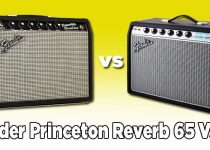Guitar Interference Noise [Reason & Solved]
In the realm of music, the guitar stands as a versatile and beloved instrument, capable of producing captivating melodies and soul-stirring harmonies. However, even the most seasoned guitarists encounter a common adversary: interference noise.

This unwanted sound can disrupt the purity of your musical expression, leaving you frustrated and searching for solutions. In this guide, we will talk about the reasons behind guitar interference noise and explore effective ways to fix it, ensuring that your music remains a seamless symphony.
# Table of Contents =>
- 1 Effective Ways to Fix Guitar Interference Noise –
Understanding Guitar Interference Noise –
a) What is Guitar Interference Noise?
Before we embark on the journey to conquer interference noise, it’s crucial to understand what it is. Guitar interference noise, often referred to as hum or buzz, manifests as an unwanted sound that interferes with the clean output of your guitar. This noise can take various forms, from a subtle hum to an annoying buzz, and it typically stems from external factors affecting the signal chain.
b) Types of Interference Noise:
Effectively addressing interference noise requires a thorough understanding of its various manifestations. Among the prevalent types are electromagnetic interference (EMI), radio-frequency interference (RFI), and ground loop interference. Each type exhibits distinctive characteristics, and the initial step in resolving the issue involves adeptly recognizing these unique traits.
Reasons Behind Guitar Interference Noise –
a) Electronic Devices and Appliances:
One primary culprit behind interference noise is the electronic devices and appliances surrounding your playing environment. From fluorescent lights to computers and smartphones, these devices emit electromagnetic signals that can infiltrate your guitar’s signal chain, leading to unwanted noise.
b) Poorly Shielded Cables:
The quality of your cables plays a significant role in determining the clarity of your guitar signal. Poorly shielded cables are susceptible to picking up external interference, contributing to the overall noise in your signal path. Understanding the importance of high-quality cables is crucial for maintaining a clean and interference-free sound.
c) Ground Loop Issues:
Ground loops, created when there are multiple paths to the ground in an electrical system, are a common source of interference noise. This phenomenon can occur when connecting various pieces of audio equipment, creating an unwanted loop that allows electrical interference to enter the signal chain.
Effective Ways to Fix Guitar Interference Noise –
a) Quality Cables and Connectors:
To combat interference noise at its source, investing in high-quality cables and connectors is paramount. Opt for shielded cables with quality insulation to minimize the risk of external interference infiltrating your signal path. Additionally, using gold-plated connectors can enhance conductivity and reduce signal degradation.
b) Utilize Noise Reduction Pedals:
Noise reduction pedals are invaluable tools in the fight against interference noise. These pedals actively identify and eliminate unwanted signals, ensuring that only your pristine guitar tone reaches the amplifier. Understanding how to properly set up and configure a noise reduction pedal can significantly improve your overall sound quality.
c) Shielding Your Guitar:
Shielding your guitar’s electronics is a proactive measure to prevent interference noise at its inception. Copper shielding tape or conductive paint applied to the guitar’s cavities creates a protective barrier, blocking external interference from reaching the sensitive components of your instrument.
d) Isolate Ground Loops:
When faced with ground loop interference, isolating and eliminating the loops is crucial. Implementing ground loop isolators or using power conditioners can break unwanted electrical pathways, effectively reducing or eliminating the hum caused by ground loops.
e) Strategic Placement of Electronic Devices:
Carefully considering the placement of electronic devices in your playing environment can mitigate interference noise. Keep your guitar away from sources of electromagnetic interference, such as computers and fluorescent lights. This simple adjustment can go a long way in preserving the purity of your guitar signal.
Conclusion –
In the pursuit of musical excellence, conquering interference noise is a vital aspect of maintaining a pure and pristine guitar tone. By understanding the reasons behind interference noise and implementing effective solutions, you empower yourself to create a symphony that resonates with clarity and brilliance.
FAQs –
Last Updated on December 2, 2023 by Perry Garner


